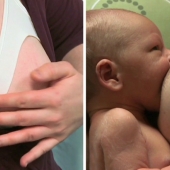The American Academy of Pediatrics (AAP) recommends breast milk as the best nutrition for babies. Babies should be breastfed exclusively for the first six months, according to the AAP. After other foods have been introduced, the AAP encourages mothers to continue to breastfeed until baby is at least a year old, and as long after that as both mother and child are willing.
Formula feeding is also a healthy choice for babies. If you use a formula, your baby will get the best possible alternative to breast milk. (You should not attempt to make your own formula or feed an infant cow's milk.)
Advantages of Breastfeeding
Good for infant's immune system: Antibodies passed from mother to child help reduce the occurrence of diseases and improve the infants immune system.
More nutritious: Breast milk contains lactose, fats and certain proteins which are very easy to digest, rich and more nutritious for the all-round growth and development of the child.
Free: Breast milk is free and costs nothing. Since it improves immunity, it means there will be less visits to the doctor due to outbreak of infections.
Different flavors: Nursing mothers need about 500 extra calories per day which means they should eat a wide variety of foods. Different flavors are thus available for the child based on the kind of foods the mothers have eaten.
Chance to have "skin-to-skin" contact: Improves bonding and emotional connection of mother and child, especially with the skin-to-skin contact.
Good for mums’ physical health: Helps the mother burn calories and reduces risk of certain medical conditions such as high blood pressure and cardiovascular diseases.
Disadvantages of Breastfeeding
More chances for being uncomfortable, especially at the onset of breastfeeding when latch-on pain is not familiar.
More frequent: Frequency and timing of breastfeeding may be inconvenient for the mother, especially in public places or very late at night.
Could be unsafe: Medical conditions such as HIV, certain treatments such as chemotherapy and certain medications may make breastfeeding unsafe for infants.
More concerts about diet for mums: Mothers should eat healthy and be careful about their food diet, especially alcohol and caffeine intake. Foods taken by the mother can be passed on to the child.
Advantages of Bottle Feeding
Very convenient: Both parents and indeed any member of the family can take part in the bonding process of feeding a child. This makes feeding less stressful for the mother.
Quite flexible: Once the bottles are made, the child’s feeding for a particular period is taken care of and feeding can be done by anybody. Also feeding is not a particular problem in public places.
Less frequent: Formula food is heavier and less easy to digest than breast milk, so formula-fed babies eat less frequently.
Less worry about diet for mums: Mothers who feed their babies with formula need not worry about the kind of foods they eat and may not be too particular about their diet.
Disadvantages of Bottle Feeding
More Preparing work: Formula food involves more time and care in preparation. Proper storage for certain periods is also vital so as to prevent formation of bacteria which can harm the child.
Short of antibodies: Formula does not contain any of the antibodies found in breast milk and thus does not improve the immunity of the child against certain infections. This makes formula-fed babies more prone to infections.
More expensive: Formula can be very expensive depending on the kind you decide to use. But none is as cheap as breast milk.
More possible to cause bowel problems: Babies fed with formula are likely to have more gas and firmer bowel movements than their breastfed counterparts.
- 3441 views













